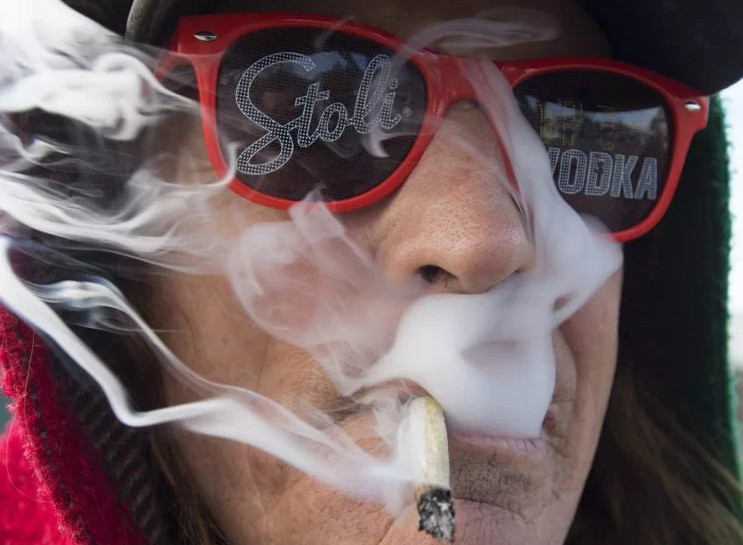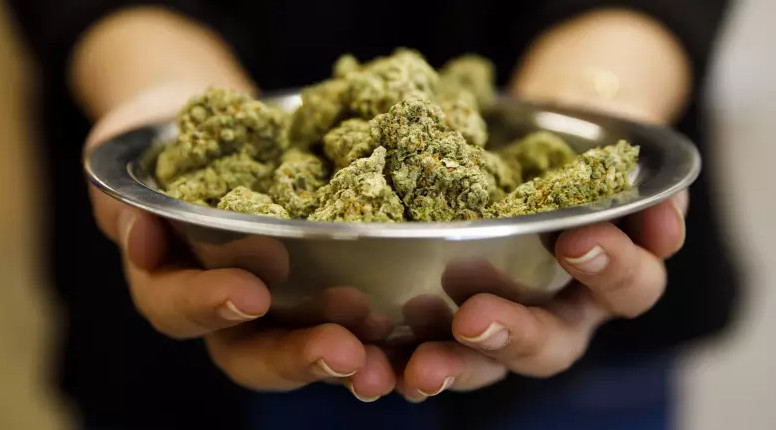On the heels of a legislative session in which Vermont lawmakers expanded the state’s medical marijuana program and nearly legalized the drug, the Vermont Medical Society may soon reaffirm its opposition to legalization.
And some physicians, including two specialists at the University of Vermont Medical Center, have proposed adding warning labels to medical marijuana and aim to restrict its use to conditions for which it has been proven to be safe and effective.
The authors of two proposed resolutions — one concerning legalization and the second focused on medical marijuana — that are up for consideration at the Vermont Medical Society’s annual meeting next month cite concerns about the threat marijuana poses to public health and the lack of scientific evidence for the use of marijuana to treat certain conditions, such as post-traumatic stress disorder, which the Legislature in June added to the list of medical marijuana qualifying conditions.
The opposition to legalization “really developed from a lot of physicians seeing a side from marijuana use that probably the public doesn’t see,” said Dr. David Rettew, a pediatric psychiatrist at the University of Vermont Medical Center who authored the resolutions with Dr. Catherine Antley, a South Burlington-based dermatopathologist, and Dr. John Hughes, an addiction specialist at UVM.
The doctors aim to counter the perception of marijuana as a safe, easy-to-use substance and to gather more information about what the effects of legalization might be, Rettew said.
“For me, there really is not a big rush to do this,” Rettew said of legalization efforts. “We should be careful, we should be deliberate. … (It) will probably take a little bit of time.”
In his own practice, Rettew said he sees “lots of adolescents who come in struggling with moderate anxiety.” His patients and their families often search for a reason for their changes in behavior anywhere but in their regular cannabis use, something he described as a “kind of statewide turning the other way.”
“Currently, more adolescents in Vermont seek out substance abuse treatment for marijuana than for all other illicit drug use combined,” according to the draft resolution on legalization that was approved unanimously by the medical society’s governing council last month and will be up for a vote at the annual meeting of the society, which represents approximately 2,000 physicians, on Nov. 4 in Woodstock.
One of the reasons physicians are opposed to legalization is that there isn’t much scientific evidence about what might happen when and if marijuana is legalized, Rettew said.
According to the proposed resolution, the physicians’ public health concerns about legalization include the potential to increase rates of use among young people, the potential to increase the risk of intrauterine exposure and the potential to increase the risk of ingestion of homegrown plants by children.
In support of their opposition, the doctors also say teens who use marijuana regularly are more likely to develop a mental illness, and point to the state’s limited resources for treating people with mental illness, particularly children and adolescents.
Dr. Geoffrey Kain, chief of addiction services at the Brattleboro Retreat, is not a member of the Vermont Medical Society but said he supports the physicians’ draft resolutions. On the legalization front, Kain said, he worries about the potential to increase access for children and adolescents.
“The more people label it as medical or something that’s legalized, the less wary people are going to be,” he said.
Gov. Phil Scott speaks at a press conference. VTDiggerHealth worries related to legalization are shared by Gov. Phil Scott, a first-term Republican who vetoed a bill last session that would have legalized marijuana and last month created a commission to study the issue.
“Gov. Scott has consistently expressed concerns about the public health and public safety impacts of legalization and expanded access to marijuana in Vermont,” Scott’s spokeswoman Rebecca Kelley said in an email last week. “Specifically, he’s stated that Vermont should work to address highway safety, education and prevention initiatives, and ensure we’re protecting our youth before we move to a fully legalized market.”
Scott’s 13-person commission, composed of lawmakers and members of the administration, is focused on understanding available research and using it to inform recommendations on how to address public health and public safety concerns, Kelley said.
The commission will also address how to tax and regulate marijuana.
Instead of legalizing marijuana, the medical society’s proposed resolution would have physicians and state agencies collaborate to educate children and adults about the negative health effects of marijuana.
It would also urge policymakers to research the effects of marijuana legalization on recruiting health care providers; Medicaid costs; emergency room visits associated with marijuana use; hospitalization rates; the number of infants who test positive for tetrahydrocannabinol, or THC, which causes marijuana’s psychotropic effect; traffic fatalities; lost productivity; law enforcement; the environment and the educational system.
It would also ask policymakers to measure the effect of decriminalization, which the Vermont Legislature enacted in 2013, on marijuana-related harm to children, marijuana-associated emergency room visits, marijuana-associated highway deaths and marijuana-related mental illness.
“A lot of us would like to see the degree to which the decriminalization process helped with some of the problems that we also acknowledge,” Rettew said. “(I) don’t think most physicians want to see people who use cannabis getting thrown in jail.”
The resolution asks policymakers to track the number of adolescents who perceive marijuana as harmful, increase the number of available substance abuse treatment facilities and decrease the use of emergency rooms for holding psychiatric patients.
But Matt Simon, the New England political director for the Washington, D.C.-based Marijuana Policy Project, said the proposed resolution opposing legalization fails to take into account flaws in the current system.
“Prohibition has not been effective policy from a public health perspective,” Simon said, adding that children and adults have ready access to cannabis now and that ease of access is likely to increase in light of the recent legalization in Maine and Massachusetts.
The resolutions’ authors fail to take into account the potential benefits of legalization, which would allow the state to tax marijuana, providing money for education and prevention, he said.
“I think it’s worth noting that the only serious legislative proposals to pay for improved education, prevention, and treatment have been those put forward by advocates of taxing and regulating marijuana — not by prohibitionists such as Drs. Antley, Rettew and Hughes,” Simon said.
Making marijuana legal wouldn’t mean that policymakers are saying it’s safe or that it will achieve any particular goal. Instead, Simon said, drawing a parallel between marijuana and alcohol, it would mean that responsible users aren’t breaking the law.
“THC/marijuana lacks the rigorous testing of drugs approved by the Food and Drug Administration for the indications for which it is now sold in Vermont dispensaries,” the same authors wrote.
Not only is marijuana not proven to have positive effects, the authors say, the drug carries risks such as causing or worsening mental illness, addiction, infertility and cognitive impairment, and it is especially risky for young patients.
The 4,438 patients enrolled in Vermont’s medical marijuana program are required to have a health care provider — a physician, naturopathic physician, physician assistant or advanced practice nurse — complete a form that certifies that they have one of the qualifying conditions for medical marijuana.
The doctors warn against marijuana use for treating psychosis, schizophrenia, depression and bipolar disorder, which may be worsened by marijuana use. They also warn against treatment of PTSD with marijuana due to a lack of scientific evidence supporting its use.
In clinical guidelines for the treatment of PTSD, the U.S. Department of Veterans Affairs and the Department of Defense — which advises clinicians treating veterans and military personnel — recommend against treating PTSD with “cannabis or cannabis derivatives due to the lack of evidence for their efficacy, known adverse effects, and associated risks.”
Simon, however, said some patients have found relief from their PTSD symptoms through cannabis use.
“(It) may not be perfect but it’s better than what they’ve been prescribed,” Simon said. “Better than a bottle of vodka.”
Physicians recognize that there may be potential medical uses of the marijuana plant, but more research is needed, Rettew said. “This process of deciding what should be allowed is really kind of doing the job of the FDA,” he said. “Taking the regulatory process … away from its normal process and bypassing it.”
Dr. Gilbert Fanciullo, an emeritus professor of anesthesiology at the Geisel School of Medicine who is also board certified in pain medicine and hospice and palliative care, said before he retired from Dartmouth-Hitchcock three months ago he saw the positive effects that marijuana can have for people suffering from pain. In particular, Fanciullo noted the value medical marijuana can have as a substitute for opioids.
“Frankly, the cannabis worked as well as the opioids, at least as well,” said Fanciullo, who is affiliated with Prime Alternative Treatment Center, a medical marijuana dispensary in Merrimack, New Hampshire.
For example, he said, he treated a woman in her 80s who switched her treatment for chronic pain from methadone to cannabis. She described the feeling of coming off of methadone as “like a gauze had been removed from the top of her head,” Fanciullo said.
He has also recommended marijuana for patients suffering from post-traumatic stress disorder.
“It calms you down, it helps you to sleep,” he said.
Fanciullo acknowledged that there are side effects to marijuana use, including a risk of addiction and psychoactive effects that make it difficult to drive or operate power tools.
It can cause people to pass out if they get up too quickly and can cause an increased heart rate; it may also increase the risk of stroke, he said. Marijuana can also damage a developing brain, and Fanciullo said he would not recommend it for children.
“You have to use judgment as a physician when qualifying patients for using marijuana,” he said.
The potential risks have to be weighed against the potential benefits, which include providing symptom relief to people who might not be able to find relief otherwise, he said.
If approved, the resolution before the Vermont Medical Society would support warning labels for medical marijuana, as well as increasing the number of physicians serving on the state’s Medical Marijuana Review Board, which is currently a three-member board of health care professionals responsible for reviewing appeals from patients who have been rejected by the state’s registry, as well as studies, data and anything else relevant to the use of marijuana for symptom relief. The board also can make recommendations to the Legislature.
The resolution asks that the review board be given the task of determining when a condition can be added to the list of those for which patients are allowed to use medical marijuana and set a THC dosage limit and concentration limit for THC-containing products sold at dispensaries.
The resolution would express the society’s support for medical research on the benefits, side effects and toxicity of cannabis.
But Fanciullo said waiting for traditional FDA studies of marijuana is not realistic. It’s “delusional to think that we’re immediately going to have all these studies,” he said.
In the meantime, marijuana is now legal in Alaska, California, Colorado, Maine, Massachusetts, Nevada, Oregon, Washington and the District of Columbia.
“The horse is already out of the barn,” he said.
credit:420intel.com




